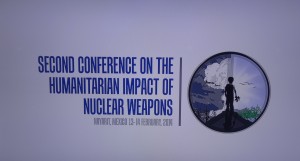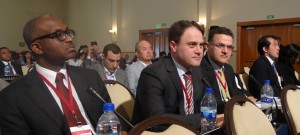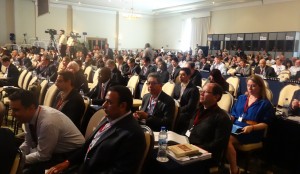 NAYARIT, MEXICO – Kazakhstan’s delegation at a major international conference in Mexico on Feb. 13-14 urged that the Comprehensive Nuclear Test-Ban Treaty (CTBT) enter into force as soon as possible, calling such a ban an important step toward global nuclear disarmament.
NAYARIT, MEXICO – Kazakhstan’s delegation at a major international conference in Mexico on Feb. 13-14 urged that the Comprehensive Nuclear Test-Ban Treaty (CTBT) enter into force as soon as possible, calling such a ban an important step toward global nuclear disarmament.
“We believe that one of the most important steps toward that goal [of global nuclear disarmament] would be the entry into force of the Comprehensive Nuclear Test Ban Treaty,” Roman Vassilenko, ambassador-at-large at Kazakhstan’s Ministry of Foreign Affairs, told representatives of 140 countries and dozens of international organisations at the second International Conference on the Humanitarian Impact of Nuclear Weapons, held in Nuevo Vallarta, Nayarit, Mexico. “And we would like to urge, yet again, the eight countries on whose signature and ratification its entry into force depends to do so promptly.”
China, Egypt, Iran, India, Israel, the Democratic People’s Republic of Korea (DPRK), Pakistan and the United States have yet to sign and/or ratify the treaty, which has been signed by 183 countries and ratified by 161 so far. Addendum II to the treaty lists more than 40 countries with nuclear weapons or nuclear energy capabilities on whose signatures and ratifications the entry into force of the treaty depends.
Vassilenko said Kazakhstan was not only promoting the CTBT entry into force, but also working to support this process by highlighting the plight of nuclear weapons testing survivors in Kazakhstan and elsewhere. Furthering this goal is President Nursultan Nazarbayev’s initiative, the ATOM Project, an education and online petition campaign. It seeks to galvanise global public opinion toward action against nuclear weapons testing and ultimately nuclear weapons themselves.
The first International Conference on the Humanitarian Impact of Nuclear Weapons, with the participation of 130 countries and numerous international bodies, was organised and hosted by Norway in Oslo in March 2013. The conferences focus on highlighting the humanitarian consequences of nuclear weapons use, either in war or in testing, and seek to create global momentum toward nuclear disarmament through such a focus.
The world’s five officially recognised nuclear weapon states – Britain, China, France, Russia and the U.S. – have so far chosen not to send representatives to the conferences, a point stressed by numerous speakers as preventing more productive and meaningful discussions.
“We strongly hope there will be even more countries participating in the next conference, at least five more countries,” Vassilenko said, welcoming the announcement made one day earlier by Austria’s Minister of Foreign Affairs Sebastian Kurtz that it would host the third such conference already in the autumn of this year.
Such statements were echoed by many others, including Angela Kane, UN High Representative for Disarmament Affairs, who said “stigmatising nuclear weapon states in their absence will not achieve the disarmament goals; we need a meaningful dialogue.” India and Pakistan, two nuclear weapon states, sent representatives to both Norway and Mexico. On the other hand, Israel, which is believed to have nuclear weapons but has neither acknowledged nor disavowed statements to this effect, has not sent representatives to the conferences.
In Mexico, Vassilenko and his colleagues also reported on Kazakhstan’s efforts to rehabilitate areas affected by nuclear tests. Roman Vakulchuk, a Kazakh national and currently a researcher with the Norwegian Institute of International Relations (NUPI), also presented a joint report by NUPI and two research institutions from eastern Kazakhstan on the lingering long-term health and environmental effects of the 40 years of Soviet nuclear weapons testing on the region and its people.
“We are grateful to the international community for recognising the severity of the problems left behind by decades of Soviet nuclear weapons testing in Semipalatinsk,” Vassilenko continued. “Already, beginning in 1997, the UN General Assembly has accepted six resolutions on international cooperation and the coordination of activities in rehabilitating the people, the environment and the economic development in the Semipalatinsk region. In view of ongoing state programmes and international assistance coordinated by the UN Development Programme, we can say there is always a need for a more coordinated approach and more active participation by the international community in this process.”
“We strongly support all the statements made at this conference calling on nuclear weapon states to engage in more vigorous activities toward fulfilling the goal of nuclear disarmament, including as prescribed by the Nuclear Non-Proliferation Treaty,” the Kazakh diplomat said. “As a country that renounced one of the world’s largest nuclear arsenals, which we inherited from the former Soviet Union, we will continue to work with all our partners in urging more progress toward global nuclear disarmament.”
Regarding the ATOM Project, Vassilenko added that close to 80,000 people from more than 100 countries have already signed its online petition to the governments of the world urging the entry into force of the CTBT.
“But we can and must achieve greater results, as we believe the voices of people throughout the world must be heard more clearly and more loudly,” he added. “And we will continue with this quest, working together and in full understanding with like-minded global initiatives such as the International Campaign to Abolish Nuclear Weapons (ICAN), International Physicians for the Prevention of Nuclear War (IPPNW), Parliamentarians for Non-Proliferation and Nuclear Disarmament (PNND) and many others.”
Conference participants were shown a brief documentary prepared by ICAN with the support of the ATOM Project dedicated to the tragic consequences of the use and testing of nuclear weapons and the need for a total ban on nuclear weapons in the world.
As Vassilenko noted: “We believe the more nations adhere to such principles of human relations as dialogue, mutual trust and mutually beneficial cooperation and follow the examples of countries that have already renounced nuclear weapons, the overwhelming majority of countries in fact, the greater chance we will all have of breaking the vicious cycles of war, conflict and mistrust and reaching the ultimate goal of building a safer world, a world without the threat of nuclear annihilation.”
Conference brings together governments and civil society, calls for actions to achieve a nuclear weapons free world
The conference reflected the evolving cooperation between governments and civil society, as many think tanks and nongovernmental organisations were not only present but were given equal time to speak at the event. Organisers have sought to achieve this balance from the beginning.
“It is important to deepen our understanding of the effects of nuclear weapons by approaching the global and long-term consequences of a nuclear detonation, accidental or deliberate, from the perspective and variables of 21st century society,” the Mexican Ministry of Foreign Affairs said in a statement prior to the event. “Governments, international organisations and civil society are invited to participate with multisectorial delegations, at the expert level, with specialists in areas such as public health, humanitarian assistance, environmental issues and civilian protection, among others, as well as diplomats and military experts.”
Along with representatives from nations, the conference was attended by experts from the UN and UN organisations such as the World Health Organisation (WHO), the International Organisation for Migration (IOM), the UN Institute for Disarmament Research (UNIDIR), the Office for the Coordination of Humanitarian Assistance (OCHA), as well as leaders from Mayors for Peace and research and nongovernmental organisations from the U.K., Norway, Switzerland and other countries. International Committee of the Red Cross Vice President Christine Beerlie and Mexican Foreign Minister José Antonio Meade Kuribreña opened the conference.
During the event, participants reviewed such issues as the challenges of a nuclear weapon detonation to national, regional and global economic growth and sustainable development; the impact of such a detonation on global health; and the risk of nuclear blasts and other effects of the detonation of nuclear weapons. A summary of the conference, presented by its Mexican chair, outlined reasons for banning nuclear weapons completely and specific approaches to further advancing the process of nuclear disarmament in the world.
“The wide range of damage and negative impact in the likelihood of a nuclear explosion, as well as the vast resources allocated to maintain and modernise nuclear arsenals, make the mere existence of these weapons absurd, question the arguments in their defense and ultimately are contrary to human dignity,” the summary said.
“Actions such as the entry into force of the Compehensive Nuclear Test-Ban Treaty as a core element of the nuclear disarmament and nuclear non-proliferation regime and the achievement of a comprehensive outcome in the 2015 Nuclear Non-Proliferation Treaty (NPT) Review Conference, together with the discussions on the humanitarian impact of nuclear weapons, are mutually reinforcing processes,” the document said.
 “The Chair warmly welcomes the Austrian offer to host the Third Conference on the Humanitarian Impact of Nuclear Weapons,” it continued. “This offer has been received with great support from participants as a follow-up to Oslo and Nayarit, to deepen the momentum, anchor these conclusions and take them forward. As it was expressed by many delegations, the Conference reiterates the invitation to nuclear weapon States and States non-parties to the NPT to participate in the Third Conference, in Austria.”
“The Chair warmly welcomes the Austrian offer to host the Third Conference on the Humanitarian Impact of Nuclear Weapons,” it continued. “This offer has been received with great support from participants as a follow-up to Oslo and Nayarit, to deepen the momentum, anchor these conclusions and take them forward. As it was expressed by many delegations, the Conference reiterates the invitation to nuclear weapon States and States non-parties to the NPT to participate in the Third Conference, in Austria.”
“In doing so, we need to take into account that, in the past, weapons have been eliminated after they have been outlawed. We believe this is the path to achieve a world without nuclear weapons,” the Mexican chair said in the summary. “In our view, this is consistent with our obligations under international law, including those derived from the NPT as well as from Common Article 1 to the Geneva Conventions.”
“The broad-based and comprehensive discussions on the humanitarian impact of nuclear weapons should lead to the commitment of States and civil society to reach new international standards and norms, through a legally binding instrument,” the summary continued. “It is the view of the Chair that the Nayarit Conference has shown that time has come to initiate a diplomatic process conducive to this goal. Our belief is that this process should comprise a specific timeframe, the definition of the most appropriate fora, and a clear and substantive framework, making the humanitarian impact of nuclear weapons the essence of disarmament efforts.”
The summary concluded, “It is time to take action. The 70th anniversary of the Hiroshima and Nagasaki attacks is the appropriate milestone to achieve our goal. Nayarit is a point of no return.”
